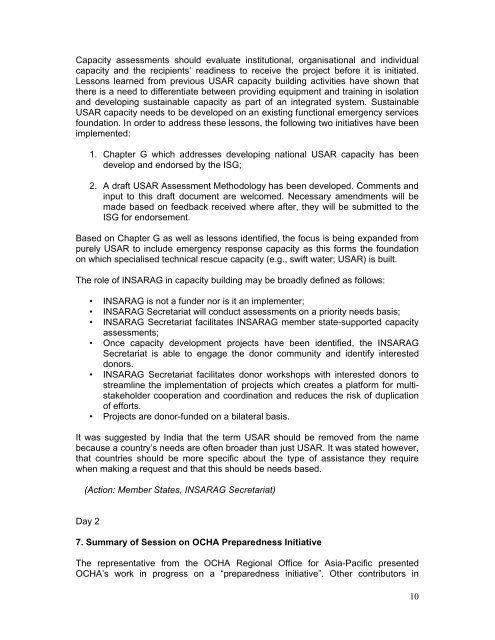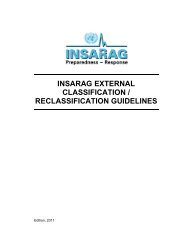Meeting of the INSARAG Regional Group Asia/Pacific Bali ...
Meeting of the INSARAG Regional Group Asia/Pacific Bali ...
Meeting of the INSARAG Regional Group Asia/Pacific Bali ...
You also want an ePaper? Increase the reach of your titles
YUMPU automatically turns print PDFs into web optimized ePapers that Google loves.
Capacity assessments should evaluate institutional, organisational and individual<br />
capacity and <strong>the</strong> recipients’ readiness to receive <strong>the</strong> project before it is initiated.<br />
Lessons learned from previous USAR capacity building activities have shown that<br />
<strong>the</strong>re is a need to differentiate between providing equipment and training in isolation<br />
and developing sustainable capacity as part <strong>of</strong> an integrated system. Sustainable<br />
USAR capacity needs to be developed on an existing functional emergency services<br />
foundation. In order to address <strong>the</strong>se lessons, <strong>the</strong> following two initiatives have been<br />
implemented:<br />
1. Chapter G which addresses developing national USAR capacity has been<br />
develop and endorsed by <strong>the</strong> ISG;<br />
2. A draft USAR Assessment Methodology has been developed. Comments and<br />
input to this draft document are welcomed. Necessary amendments will be<br />
made based on feedback received where after, <strong>the</strong>y will be submitted to <strong>the</strong><br />
ISG for endorsement.<br />
Based on Chapter G as well as lessons identified, <strong>the</strong> focus is being expanded from<br />
purely USAR to include emergency response capacity as this forms <strong>the</strong> foundation<br />
on which specialised technical rescue capacity (e.g., swift water; USAR) is built.<br />
The role <strong>of</strong> <strong>INSARAG</strong> in capacity building may be broadly defined as follows:<br />
• <strong>INSARAG</strong> is not a funder nor is it an implementer;<br />
• <strong>INSARAG</strong> Secretariat will conduct assessments on a priority needs basis;<br />
• <strong>INSARAG</strong> Secretariat facilitates <strong>INSARAG</strong> member state-supported capacity<br />
assessments;<br />
• Once capacity development projects have been identified, <strong>the</strong> <strong>INSARAG</strong><br />
Secretariat is able to engage <strong>the</strong> donor community and identify interested<br />
donors.<br />
• <strong>INSARAG</strong> Secretariat facilitates donor workshops with interested donors to<br />
streamline <strong>the</strong> implementation <strong>of</strong> projects which creates a platform for multistakeholder<br />
cooperation and coordination and reduces <strong>the</strong> risk <strong>of</strong> duplication<br />
<strong>of</strong> efforts.<br />
• Projects are donor-funded on a bilateral basis.<br />
It was suggested by India that <strong>the</strong> term USAR should be removed from <strong>the</strong> name<br />
because a country’s needs are <strong>of</strong>ten broader than just USAR. It was stated however,<br />
that countries should be more specific about <strong>the</strong> type <strong>of</strong> assistance <strong>the</strong>y require<br />
when making a request and that this should be needs based.<br />
(Action: Member States, <strong>INSARAG</strong> Secretariat)<br />
Day 2<br />
7. Summary <strong>of</strong> Session on OCHA Preparedness Initiative<br />
The representative from <strong>the</strong> OCHA <strong>Regional</strong> Office for <strong>Asia</strong>-<strong>Pacific</strong> presented<br />
OCHA’s work in progress on a “preparedness initiative”. O<strong>the</strong>r contributors in<br />
10




